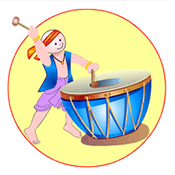
Dimdima
Online Children's Magazine from India

Dimdima
Online Children's Magazine from India


Born Bangalore, 10 June 1955
On a fine day in 1971, at Jabalpur, a young Prakash Padukone watched in awe as the legendary Indonesian shuttler, Rudy Hartono did 10,000 skips and then played a game full of jumps and smashes. That was the day India’s Badminton fortunes took an upward turn. Prakash’s decision to trade his defensive style for the more robust style of play of the Indonesians was to pay him rich dividends in the years to come.
Shy and soft-spoken, Prakash was initiated into the game at a tender age by his father. Padukone Sr. was the Secretary of the Mysore Badminton Association for many years and saw in his son the talent to make it big in the game very early. Prakash, playing in his first tournament a year later, in September 1962, lost in the first round and howling at the top of his voice, refused to leave the court. He relented only when the President of the Association promised him a new racquet. Two years later he won the state junior championship.
Prakash became the junior national champion in 1970. After that fateful day in Jabalpur, having changed gears, he won both the junior and the senior nationals in 1972. He was now head and shoulders above every other player in the country and was promptly included in the Thomas Cup squad. But it wasn't till 1979 that he won his first major international title, that of the Commonwealth games.
Wins at the London Masters’ Open, the Danish Open and the Swedish Open gave him the confidence necessary to aim for the coveted All England Open title. Only a year earlier, seeded number one at the same tournament, Prakash had had to withdraw with a painful heel injury. He was now fit and raring to go.
Prakash met Liem Swie King, the reigning champion in the finals of the All England Open and beat him in straight games. “I’ve done it!” cried Prakash, and all hell broke lose. A new King had been crowned! A teetotaller, he took a sip of the champagne that was making the rounds, but not before diluting it with apple juice. When the Indian team coach asked the women members of the team to kiss Prakash, they just blushed. The usually bashful Prakash however saved them the embarrassment by pecking each of them on their cheeks!
The ‘killer instinct’, the lack of which has been the bane of Indian sport for long, was now a part of Prakash’s armoury. In the Swedish Open of 1980, however, he met Rudy Hartono in the early rounds and beat him 9-15, 15-12 and 15-1. “ I could have beaten him on ‘love’ in the last game, but I did not have the heart to do that to my Idol. So I ensured that he got one point before I beat him,” says Prakash, ever the gentleman.
Prakash, who lives in Bangalore with wife Ujjala and two daughters, now runs a Badminton Academy and has already produced some world-beaters.
last updated on: 7/11/2003
EXPLORE MORE...
Get Help or Give Help.
- Do you have a Sports Question?
- Post it here and get the answer.
- Some questions posted by others are not yet answered.
- View those questions and answer them.
Dimdima is the Sanskrit word for ‘drumbeat’. In olden days, victory in battle was heralded by the beat of drums or any important news to be conveyed to the people used to be accompanied with drumbeats.
Bharatiya Vidya Bhavan
K. M Munshi Marg,
Chowpatty, Mumbai - 400 007
email : editor@dimdima.com
Bharatiya Vidya Bhavan
505, Sane Guruji Marg,
Tardeo, Mumbai - 400 034
email : promo@dimdima.com
Dimdima.com, the Children's Website of Bharatiya Vidya Bhavan launched in 2000 and came out with a Printed version of Dimdima Magazine in 2004. At present the Printed Version have more than 35,000 subscribers from India and Abroad.